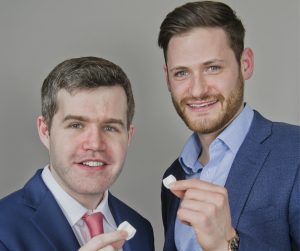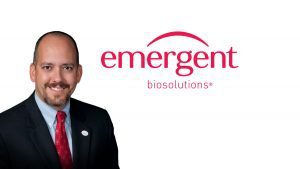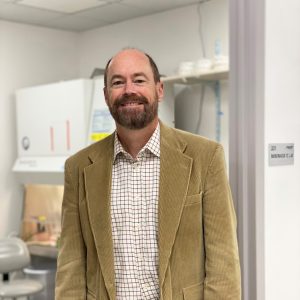
In Conversation: Matthew Hewitt, Ph.D., Executive Director at Charles River Laboratories
If you’re a scientist, chances are when you hear the name “Charles River Laboratories” (Charles River) you may initially think of their industry-leading research models, which are a staple for research labs globally.
But did you also know that Charles River offers a plethora of products and services for translational laboratories and life science companies alike that span across the drug development lifecycle?
One of their most exciting recent offerings are their integrated, end-to-end cell and gene therapy solutions, which as of today have supported in the development of 10 FDA-approved cell and gene therapies, including 75% of the FDA-approved cell and gene therapies just last year.
Matthew Hewitt, who joined Charles River just eight months ago as the Executive Director, Scientific Solutions Cell & Gene Therapy, sat down with BioBuzz to share more about Charles River’s cell and gene therapy capabilities and how he believes Charles River’s cell and gene therapy portfolio can speed program development.
“Within the past three or so years Charles River has undergone quite the transformation. We’ve made exciting moves acquiring and integrating critical cell and gene therapy services and products, in particular the addition of development and manufacturing services, complementing our existing capabilities. I joined as a scientific leader in this important mission to illustrate how our solutions and interdisciplinary team of experts can accelerate program development,” said Hewitt. Hewitt went on to explain the drug development pathway and how these solutions help accelerate and streamline development.
If you’re looking down from a 1,000-ft view, the road to getting a drug to market seems straightforward. You nail down a target you wish to pursue, execute R&D in preclinical then move to translational studies and ultimately enter the clinic treating patients. If all goes well, eventually a drug marketing application, referred to as a biologics license application (BLA) in the US, is submitted to seek regulatory approval to make these potentially curative therapies widely available to patients.
Zoom in closer, though, and you’ll see the development road is anything but straight.
And it’s littered with potholes, some of which could potentially turn into sink holes that cause costly delays.
“There are many different relationships that companies must build as they navigate the winding roads of drug development. Sometimes this means managing up to nine or more different, and often concurrent, contract relationships, each with different obligations, timelines, and other nuances,” explained Hewitt. “Naturally, keeping things in-sync can become challenging with this many balls in the air, and if you run into an issue with any of these partners it can throw a major wrench in your operations.”
“Even further, cell and gene therapy drug development workflows are not the same as traditional small molecule development, which I had experience in for almost a decade after finishing my postdoc. Cell and gene therapies require a different set of expertise, and it’s harder to predict clinical efficacy of these therapies based on research models. The field is also still very new for drug developers.” Hewitt added.
Driven by a mission to accelerate the delivery of innovative treatments to patients, Charles River’s cell and gene therapy offerings help to fill in or avoid those potholes, making the development journey from concept-to-commercial faster and smoother by offering integrated, end-to-end, proven services and products.
“You can bring us a sequence for a promising tumor target and our antibody discovery group can generate an antibody which can be used independently or developed further into a chimeric antigen receptor (CAR) utilized in CAR-T cell therapies. Or we can generate nanobodies, which are starting to be used more in cell therapy as a replacement for CARs and in gene therapy,” said Hewitt. “We have groups which can perform target screening and safety, evaluating good pharmacology, on-target/on-tumor, as well as bad pharmacology, on-target/off-tumor effects. And from there, we can move into in vitro/in vivo safety and beyond.”
Within the last few years several of the key acquisitions Charles River made further strengthened their capabilities and ability to deliver on their mission. In December 2019 they acquired HemaCare, which has a massive amount of experience in cell collections – greater than 300,000, according to Hewitt, and further bolstered that cell supply portfolio with the addition of Cellero in August 2020. In February 2021, Charles River acquired Hanover, MD and Memphis, TN-based Cognate BioServices and UK-based Cobra Biologics, providing them with cell and gene therapy contract development and manufacturing organization (CDMO) capabilities and an expanded global footprint to further build and enhance their integrated cell and gene therapy portfolio. To sweeten the deal even further, the company acquired Rockville-based Vigene Biosciences in May 2021 to boost their plasmid and viral vector off-the-shelf products and expanding their CDMO capabilities.
“We have a comprehensive cell and gene therapy portfolio, providing support to programs from concept-to-commercialization. These end-to-end capabilities represent a differentiated offering in the field,” said Hewitt.
Even more exciting, Charles River has extensive testing capabilities and does all their product release testing internally – which complements their CDMO capabilities.
“When someone asks me who our preferred testing provider is, I take a lot of pride in telling them that it’s us – we’re the testing providers, because I know this enables us to be an even stronger partner to therapeutic developers,” added Hewitt.
There’s no doubt Charles River has become a force to be reckoned with in the CDMO space, but the team knows that they must continue innovating and adapting to meaningfully serve the rapidly growing cell and gene therapy space. In the near term, Charles River has ongoing expansions increasing capabilities and capacities, with the most recent expansion announcement being their CDMO Alderley Park, UK expansion. This expansion is just one of many that will follow as they continue to create a strong integrated global network to reliably serve their customers.
“These fields move quickly and don’t wait for anyone, and they shouldn’t. We’re always working to expand and improve our services and solutions so that Charles River continues to meet the field’s growing needs with sufficient capacity to deliver safe and effective treatments to patients in need,” said Hewitt.
Just recently Charles River founded a new group within the organization called the “Navigators”, which act as a north star to customers as they move through the Charles River portfolio. They sit above the entire portfolio and serve as the main point of contact, removing the stressors of having to communicate with multiple project managers and changing contacts at different stages in development.
Further, Charles River is in the midst of a large, company-wide digitization initiative. The initiative’s ultimate deliverable is providing partners the transparency to see where their studies sit at any given time. The company is rolling out digital solutions in steps on the CDMO side to enable them to stay at the front of the manufacturing revolution, including paperless manufacturing.
It takes an immense amount of work to make all this possible, but at the end of the day Hewitt says that it’s absolutely worth it for the patients and their families, Charles River and the clients it serves.
“At the end of the day, what drives us is the desire to get these new, promising, and hopefully curative therapies into the clinic to patients as efficiently and safely as possible, because many don’t have time to wait.”
For more information on Charles River’s cell and gene therapy development and manufacturing services, please visit: Cell and Gene Therapy CDMO Solutions.
Learn more about Charles River’s journey to provide end-to-end cell and gene therapy solutions through the integration of multiple acquisitions, such as Cobra Biologics, Cognate BioServices, and Vigene Biosciences here.
- About the Author
- Latest Posts
Sarah Ellinwood is BioBuzz’s Managing Editor. A scientist by training and a science communicator at heart, Sarah specializes in making complex concepts understandable, engaging, and exciting. She received her Ph.D. in molecular and cellular biology with a focus in infectious disease immunology from the University of Maryland and is passionate about all things related to scicomm, peer mentorship, and women in STEM.





